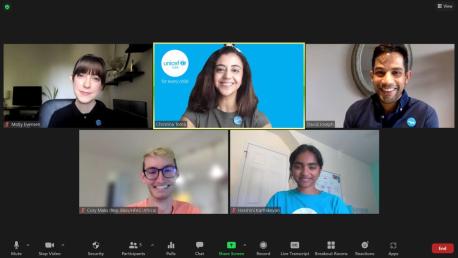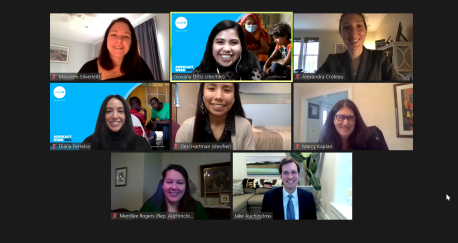
Congress Passes FY17 Appropriations for UNICEF
The Omnibus Appropriations for Fiscal Year 2017 just passed Congress and was signed by the President, securing $132.5 million for UNICEF – exactly what UNICEF advocates had sought.
UNICEF USA advocates with the U.S. Congress to secure the U.S. Government’s annual contribution to UNICEF in the State, Foreign Operations and Related Programs Appropriations. This is in addition to private sector fundraising by UNICEF USA on behalf of UNICEF.
We spoke with Martin Rendón, UNICEF USA's Vice President for Public Policy and Advocacy, to learn more.
Tell us about the funding Congress provides to UNICEF.
Martin Rendón: Each year, the U.S. Government makes a voluntary contribution to UNICEF. The Administration makes a recommendation and the Congress decides how much to provide in the annual appropriations bill. This money goes to UNICEF’s essential “core” programs in countries around the world.
What are the challenges to secure this funding?
Rendón: The funding for UNICEF is just one among thousands of programs and activities in the U.S. Federal Budget. In recent years, Congress has encountered delays and setbacks in efforts to reach agreement on overall Federal spending. In 2016, for example, Congress was not able to pass the regular appropriations bills for Fiscal Year 2017, and instead, enacted a Continuing Resolution to keep the government running through April 28, 2017 at the same funding levels as those in Fiscal Year 2016.
This April, with the clock running out, the House and Senate Appropriations Committees revisited the work they had done last year on the appropriations for Fiscal Year 2017. They wrapped the individual spending bills in an "Omnibus Appropriations Bill." By a vote of 309 to 118 in the House of Representatives and 79 to 18 in the Senate, the bill was passed, preserving UNICEF's $132.5 million voluntary government contribution. President Trump then signed the bill.
Does UNICEF have bipartisan support?
Rendón: Of course. We believe that children in need know no politics. We work with legislators on both sides of the aisle.
How does UNICEF USA advocate for UNICEF on Capitol Hill?
“We reach out to and work with legislators on both sides of the aisle.”
Rendón: In Washington, our Office of Public Policy and Advocacy is in direct contact with the key legislators and their staff. But our work can only succeed if all our supporters across the country join us by contacting their Senators and Representatives. You can find our advocacy efforts on our website. The decision-makers need to hear from their constituents that they want them to support UNICEF!
What if my Senator or Representative isn’t on the Appropriations Committee?
Rendón: It doesn’t matter whether or not your Senator or Representative is on the Appropriations Committee or on any other key committee involving an issue of importance to UNICEF. Every Senator and Representative needs to be asked by his or her constituents to contact their colleagues who are making the funding or policy decisions. In effect, we are asking our own legislators to advocate with us. Their colleagues pay attention to them when they weigh in.
So what’s next?
Rendón: We need to gear up for UNICEF’s funding for Fiscal Year 2018. Once again, we will be seeking to secure $132.5 million for UNICEF. While the budget certainly will be tight, we hope the $132.5 million we just obtained for Fiscal Year 2017 will provide us with momentum for Fiscal Year 2018. We want Congress to do it again! Vulnerable children around the world are depending on us. We encourage our supporters to join in our efforts on a variety of pending policy issues, in addition to the funding for UNICEF. Together, we can make a measurable difference in the lives of millions of children!



